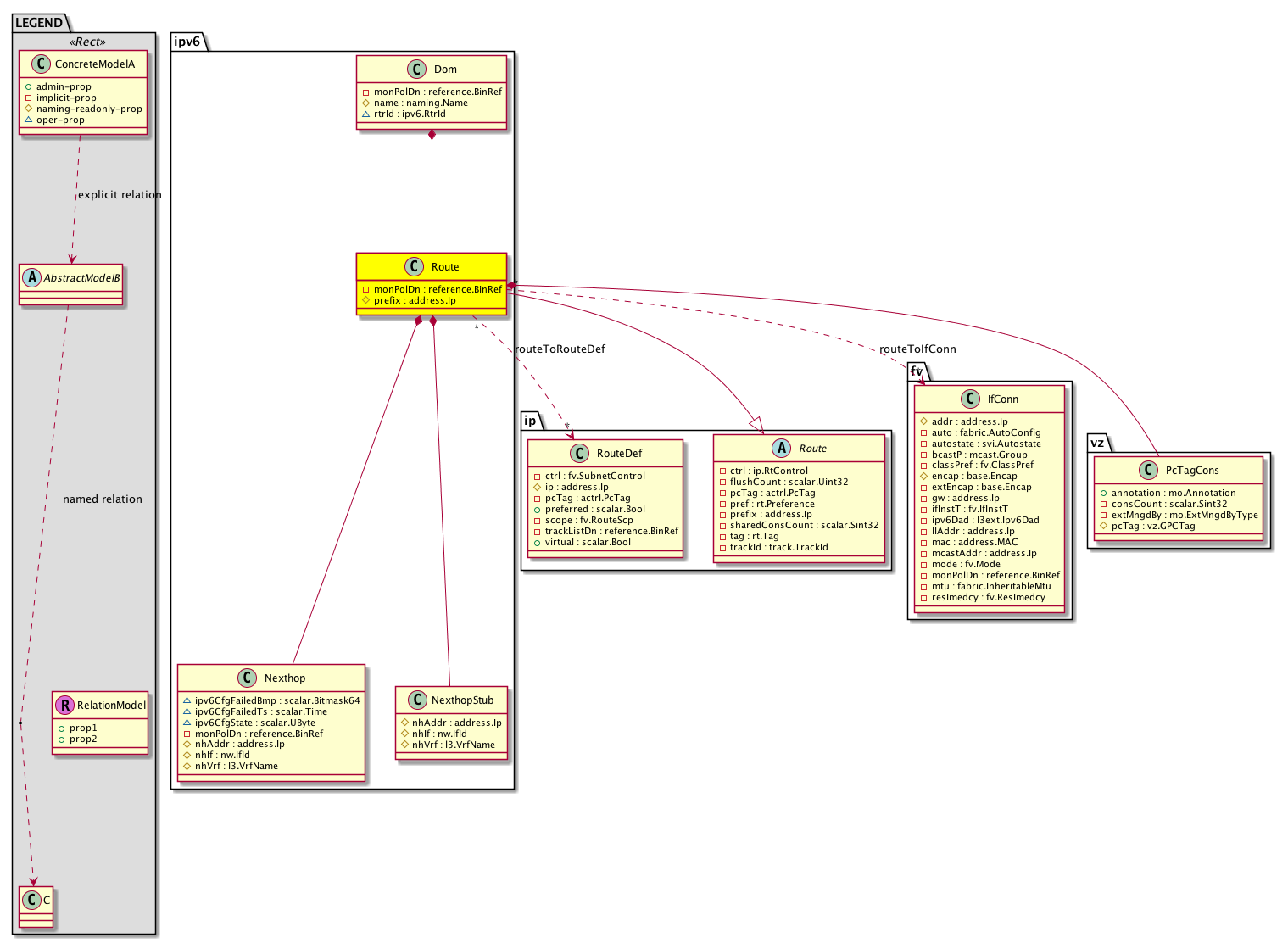| Properties Summary |
| Defined in: mo:Resolvable |
mo:Owner
scalar:Enum8
|
lcOwn (mo:Resolvable:lcOwn)
A value that indicates how this object was created. For internal use only.
|
childAction
Type: mo:ModificationChildAction
Primitive Type: scalar:Bitmask32
Units: null
Encrypted: false
Access: implicit
Category: TopLevelChildAction
Comments:
-
Delete or ignore. For internal use only.
| |
| Constants |
| deleteAll |
16384u |
deleteAll |
NO COMMENTS
|
| ignore |
4096u |
ignore |
NO COMMENTS
|
| deleteNonPresent |
8192u |
deleteNonPresent |
NO COMMENTS
|
| DEFAULT |
0 |
--- |
This type is used to
|
|
ctrl
Type: ip:RtControl
Primitive Type: scalar:Bitmask8
Units: null
Encrypted: false
Access: implicit
Category: TopLevelRegular
Comments:
-
| |
| Constants |
| unspecified |
0 |
Unspecified |
Unspecified
|
| pervasive |
1 |
Pervasive route |
Pervasive
|
| bfd |
2 |
BFD |
Bidirectional Forwarding Detection
|
| dst-unreachable |
4 |
Destination unreachable |
Dest-unreachable
|
| track-object |
8 |
Object tracked by IPSLA |
Object to be tracked
|
| DEFAULT |
unspecified(0) |
Unspecified |
Unspecified
|
|
descr
Type: naming:Descr
Primitive Type: string:Basic
Like: naming:Described:descr
Units: null
Encrypted: false
Access: admin
Category: TopLevelRegular
Comments:
-
Specifies a control instrumentation description.
dn
Type: reference:BinRef
Units: null
Encrypted: false
Access: implicit
Category: TopLevelDn
Comments:
-
A tag or metadata is a non-hierarchical keyword or term assigned to the fabric module.
flushCount
Type: scalar:Uint32
Units: null
Encrypted: false
Access: implicit
Category: TopLevelRegular
Comments:
-
Counts the number of times end-points under this subnet have been flushed.
lcOwn
Type: mo:Owner
Primitive Type: scalar:Enum8
Units: null
Encrypted: false
Access: implicit
Category: TopLevelRegular
Comments:
-
A value that indicates how this object was created. For internal use only.
| |
| Constants |
| local |
0 |
Local |
NO COMMENTS
|
| policy |
1 |
Policy |
NO COMMENTS
|
| replica |
2 |
Replica |
NO COMMENTS
|
| resolveOnBehalf |
3 |
ResolvedOnBehalf |
NO COMMENTS
|
| implicit |
4 |
Implicit |
NO COMMENTS
|
| DEFAULT |
local(0) |
Local |
NO COMMENTS
|
|
modTs
Type: mo:TStamp
Primitive Type: scalar:Date
Units: null
Encrypted: false
Access: implicit
Category: TopLevelRegular
Comments:
-
The time when this object was last modified.
| |
| Constants |
| never |
0ull |
never |
NO COMMENTS
|
| DEFAULT |
never(0ull) |
never |
NO COMMENTS
|
|
monPolDn
Type: reference:BinRef
Units: null
Encrypted: false
Access: implicit
Category: TopLevelRegular
Comments:
-
The monitoring policy attached to this observable object.
name
Type: naming:Name
Primitive Type: string:Basic
Overrides:naming:NamedObject:name
Units: null
Encrypted: false
Access: admin
Category: TopLevelRegular
Comments:
-
null
nameAlias
Type: naming:NameAlias
Primitive Type: string:Basic
Units: null
Encrypted: false
Access: admin
Category: TopLevelRegular
Comments:
-
NO COMMENTS
pcTag
Type: actrl:PcTag
Primitive Type: scalar:Uint32
Units: null
Encrypted: false
Access: implicit
Category: TopLevelRegular
Comments:
-
| |
| Constants |
| any |
0u |
any |
NO COMMENTS
|
| DEFAULT |
0 |
--- |
Policy control tag
|
|
pref
Type: rt:Preference
Primitive Type: scalar:UByte
Units: null
Encrypted: false
Access: implicit
Category: TopLevelRegular
Comments:
-
| |
| Constants |
| defaultValue |
1 |
--- |
NO COMMENTS
|
|
prefix
Type: address:Ip
Overrides:ip:Route:prefix
Units: null
Encrypted: false
Naming Property -- [NAMING RULES]
Access: naming
Category: TopLevelRegular
Comments:
-
IP address/mask to be reached.
rn
Type: reference:BinRN
Units: null
Encrypted: false
Access: implicit
Category: TopLevelRn
Comments:
-
Identifies an object from its siblings within the context of its parent object. The distinguished name contains a sequence of relative names.
sharedConsCount
Type: scalar:Sint32
Units: null
Encrypted: false
Access: implicit
Category: TopLevelRegular
Comments:
-
Shared Consumer Count
status
Type: mo:ModificationStatus
Primitive Type: scalar:Bitmask32
Units: null
Encrypted: false
Access: implicit
Category: TopLevelStatus
Comments:
-
The upgrade status. This property is for internal use only.
| |
| Constants |
| created |
2u |
created |
In a setter method: specifies that an object should be created.
An error is returned if the object already exists.
In the return value of a setter method: indicates that an object has been created.
|
| modified |
4u |
modified |
In a setter method: specifies that an object should be modified
In the return value of a setter method: indicates that an object has been modified.
|
| deleted |
8u |
deleted |
In a setter method: specifies that an object should be deleted.
In the return value of a setter method: indicates that an object has been deleted.
|
| DEFAULT |
0 |
--- |
This type controls the life cycle of objects passed in the XML API.
When used in a setter method (such as configConfMo), the ModificationStatus
specifies whether an object should be created, modified, deleted or removed.
In the return value of a setter method, the ModificationStatus indicates the actual
operation that was performed. For example, the ModificationStatus is set to "created"
if the object was created. The ModificationStatus is not set if the object was neither
created, modified, deleted or removed.
When invoking a setter method, the ModificationStatus is optional:
If a setter method such as configConfMo is invoked and the ModificationStatus
is not set, the system automatically determines if the object should be created or modified.
|
|
tag
Type: rt:Tag
Primitive Type: scalar:Uint32
Units: null
Encrypted: false
Access: implicit
Category: TopLevelRegular
Comments:
-
| |
| Constants |
| defaultValue |
0u |
--- |
NO COMMENTS
|
|
trackId
Type: track:TrackId
Primitive Type: scalar:Uint32
Units: null
Encrypted: false
Access: implicit
Category: TopLevelRegular
Comments:
-
Object Id to track route by OTM

